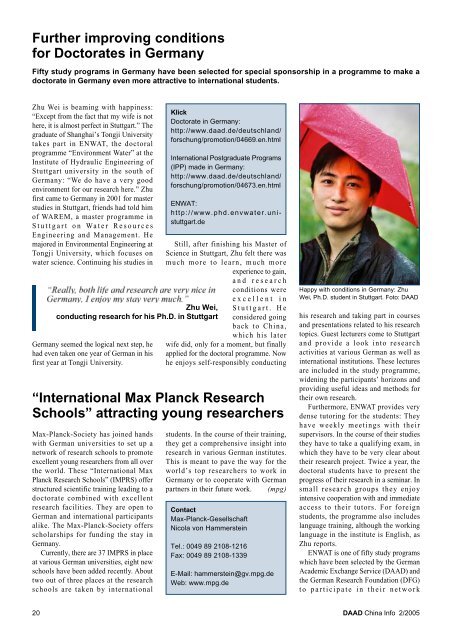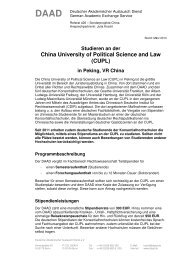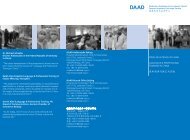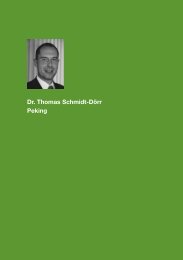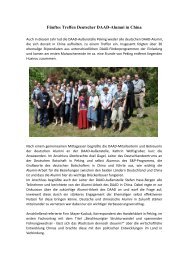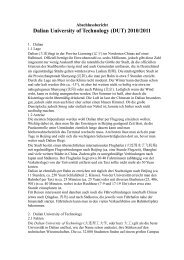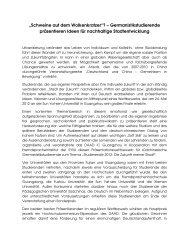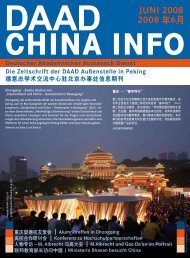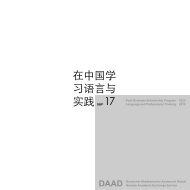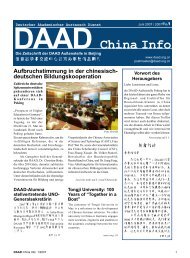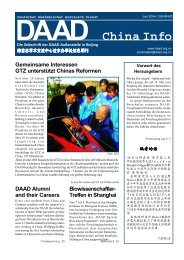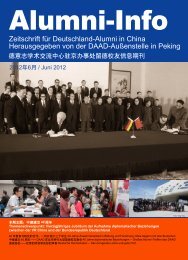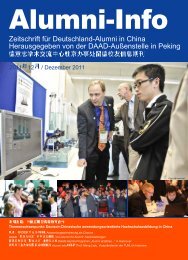China Info - DAAD
China Info - DAAD
China Info - DAAD
Sie wollen auch ein ePaper? Erhöhen Sie die Reichweite Ihrer Titel.
YUMPU macht aus Druck-PDFs automatisch weboptimierte ePaper, die Google liebt.
Further improving conditions<br />
for Doctorates in Germany<br />
Fifty study programs in Germany have been selected for special sponsorship in a programme to make a<br />
doctorate in Germany even more attractive to international students.<br />
Zhu Wei is beaming with happiness:<br />
“Except from the fact that my wife is not<br />
here, it is almost perfect in Stuttgart.” The<br />
graduate of Shanghai’s Tongji University<br />
takes part in ENWAT, the doctoral<br />
programme “Environment Water” at the<br />
Institute of Hydraulic Engineering of<br />
Stuttgart university in the south of<br />
Germany: “We do have a very good<br />
environment for our research here.” Zhu<br />
first came to Germany in 2001 for master<br />
studies in Stuttgart, friends had told him<br />
of WAREM, a master programme in<br />
Stuttgart on Water Resources<br />
Engineering and Management. He<br />
majored in Environmental Engineering at<br />
Tongji University, which focuses on<br />
water science. Continuing his studies in<br />
Zhu Wei,<br />
conducting research for his Ph.D. in Stuttgart<br />
Germany seemed the logical next step, he<br />
had even taken one year of German in his<br />
first year at Tongji University.<br />
Klick<br />
Doctorate in Germany:<br />
http://www.daad.de/deutschland/<br />
forschung/promotion/04669.en.html<br />
International Postgraduate Programs<br />
(IPP) made in Germany:<br />
http://www.daad.de/deutschland/<br />
forschung/promotion/04673.en.html<br />
ENWAT:<br />
http://www.phd.envwater.unistuttgart.de<br />
Still, after finishing his Master of<br />
Science in Stuttgart, Zhu felt there was<br />
much more to learn, much more<br />
experience to gain,<br />
and research<br />
conditions were<br />
excellent in<br />
Stuttgart. He<br />
considered going<br />
back to <strong>China</strong>,<br />
which his later<br />
wife did, only for a moment, but finally<br />
applied for the doctoral programme. Now<br />
he enjoys self-responsibly conducting<br />
“International Max Planck Research<br />
Schools” attracting young researchers<br />
Max-Planck-Society has joined hands<br />
with German universities to set up a<br />
network of research schools to promote<br />
excellent young researchers from all over<br />
the world. These “International Max<br />
Planck Research Schools” (IMPRS) offer<br />
structured scientific training leading to a<br />
doctorate combined with excellent<br />
research facilities. They are open to<br />
German and international participants<br />
alike. The Max-Planck-Society offers<br />
scholarships for funding the stay in<br />
Germany.<br />
Currently, there are 37 IMPRS in place<br />
at various German universities, eight new<br />
schools have been added recently. About<br />
two out of three places at the research<br />
schools are taken by international<br />
students. In the course of their training,<br />
they get a comprehensive insight into<br />
research in various German institutes.<br />
This is meant to pave the way for the<br />
world’s top researchers to work in<br />
Germany or to cooperate with German<br />
partners in their future work. (mpg)<br />
Contact<br />
Max-Planck-Gesellschaft<br />
Nicola von Hammerstein<br />
Tel.: 0049 89 2108-1216<br />
Fax: 0049 89 2108-1339<br />
E-Mail: hammerstein@gv.mpg.de<br />
Web: www.mpg.de<br />
Happy with conditions in Germany: Zhu<br />
Wei, Ph.D. student in Stuttgart. Foto: <strong>DAAD</strong><br />
his research and taking part in courses<br />
and presentations related to his research<br />
topics. Guest lecturers come to Stuttgart<br />
and provide a look into research<br />
activities at various German as well as<br />
international institutions. These lectures<br />
are included in the study programme,<br />
widening the participants’ horizons and<br />
providing useful ideas and methods for<br />
their own research.<br />
Furthermore, ENWAT provides very<br />
dense tutoring for the students: They<br />
have weekly meetings with their<br />
supervisors. In the course of their studies<br />
they have to take a qualifying exam, in<br />
which they have to be very clear about<br />
their research project. Twice a year, the<br />
doctoral students have to present the<br />
progress of their research in a seminar. In<br />
small research groups they enjoy<br />
intensive cooperation with and immediate<br />
access to their tutors. For foreign<br />
students, the programme also includes<br />
language training, although the working<br />
language in the institute is English, as<br />
Zhu reports.<br />
ENWAT is one of fifty study programs<br />
which have been selected by the German<br />
Academic Exchange Service (<strong>DAAD</strong>) and<br />
the German Research Foundation (DFG)<br />
to participate in their network<br />
20 <strong>DAAD</strong> <strong>China</strong> <strong>Info</strong> 2/2005


